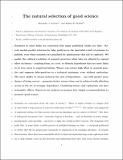The natural selection of good science
Abstract
Scientists in some fields are concerned that many published results are false. Recent models predict selection for false positives as the inevitable result of pressure to publish, even when scientists are penalized for publications that fail to replicate. We model the cultural evolution of research practices when laboratories are allowed to expend effort on theory, enabling them, at a cost, to identify hypotheses that are more likely to be true, before empirical testing. Theory can restore high effort in research practice and suppress false positives to a technical minimum, even without replication. The mere ability to choose between two sets of hypotheses, one with greater prior chance of being correct, promotes better science than can be achieved with effortless access to the set of stronger hypotheses. Combining theory and replication can have synergistic effects. On the basis of our analysis, we propose four simple recommendations to promote good science.
Citation
Stewart , A J & Plotkin , J B 2021 , ' The natural selection of good science ' , Nature Human Behaviour . https://doi.org/10.1038/s41562-021-01111-x
Publication
Nature Human Behaviour
Status
Peer reviewed
ISSN
2397-3374Type
Journal article
Collections
Items in the St Andrews Research Repository are protected by copyright, with all rights reserved, unless otherwise indicated.

